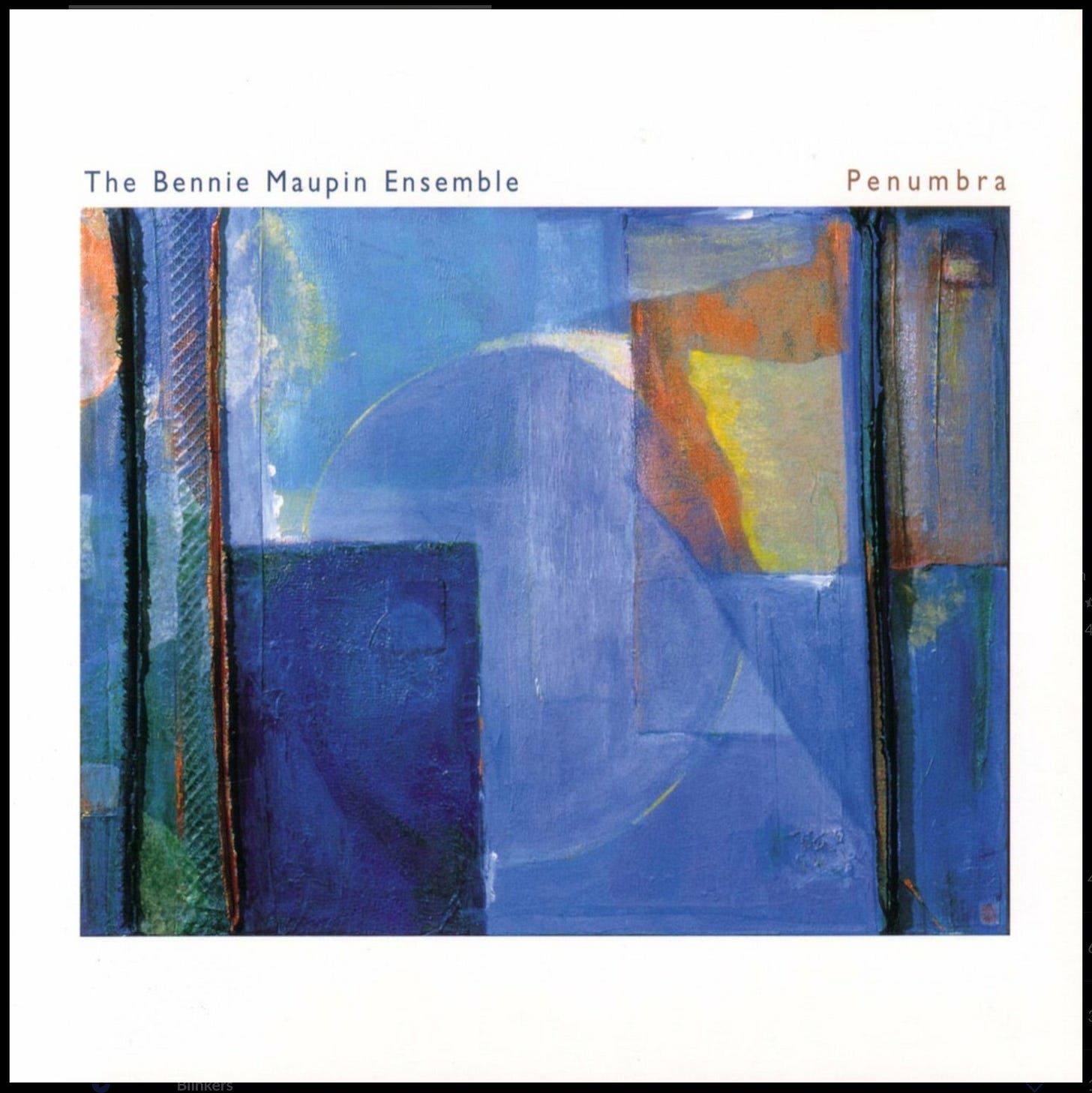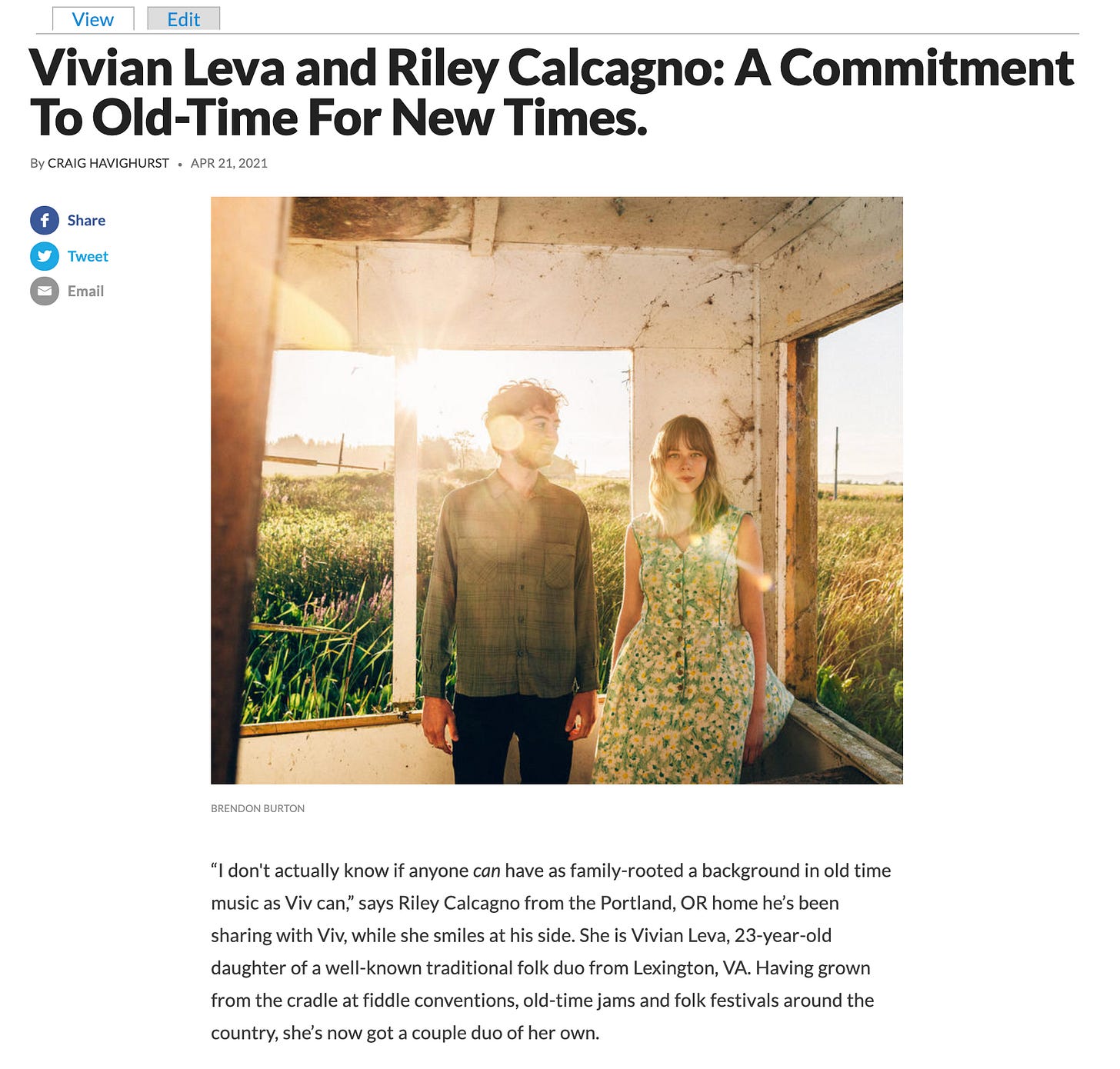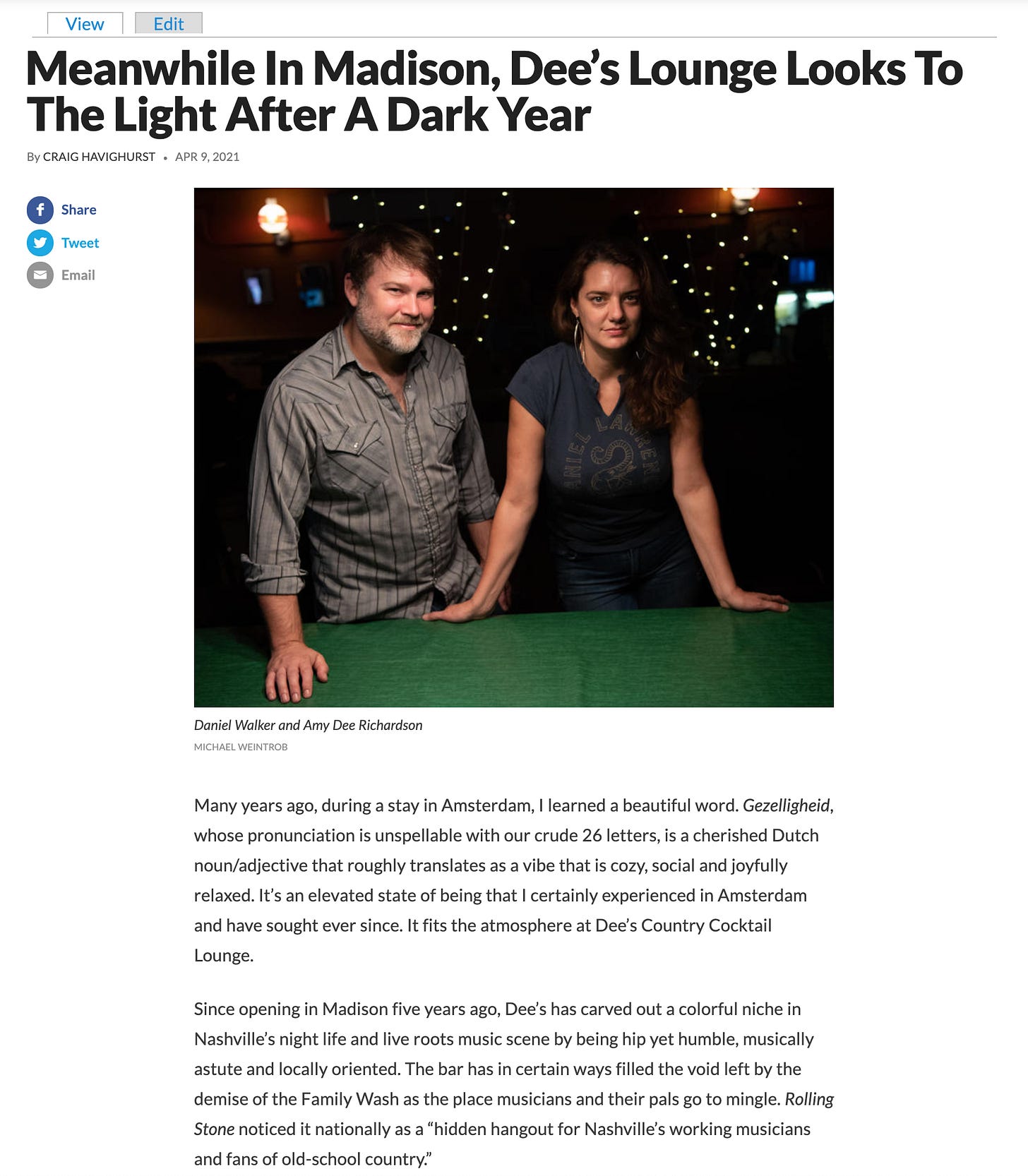String Theories, Inbox Edition
Vol. 1, No. 11

Recent weeks have come in a rush, the most energizing time I can recall in years. I enjoyed some powerful reunions (hugs!) with vaccinated friends, received some good work news, published a WMOT piece I’m particularly proud of (posted below) and got outside a lot. I saw construction moving ahead on the Music City Roots Barn and watched my wife take amazing steps in the next life of her business. It began to feel like a post-Covid existence, with all due humility and sympathy for India and other places where it’s definitely not over.
But if you’ve followed along or signed up for this newsletter just recently, you’ll know that much of last week’s excitement came from processing the reaction to my essay last Sunday about Rick Skaggs. I could tell by about Tuesday that at least I had not made a terrible mistake. I don’t typically get notes and calls about my essays (hate to disillusion you) but I sure did with this one, and the overwhelming message was one of support for the necessity of speaking up and the tone I worked hard to maintain. In a curious twist, I lost access to Facebook about two weeks ago after a midnight hack that required me to lock down my account. So I did not have visibility into the comment threads there. Friends reported some of the reactionary defensiveness and hostility I might have expected from the right, but all in all, not much. And I’m actually very glad I couldn’t be tempted to get sucked into that vortex of conflict.
All that said, this has given me more insight into our sad and intractable national crisis of info-war and tribal politics.
In the cable news and internet age, we’ve been exposed to infinitely more example-setters and role models who embrace total war and zero empathy than those who practice civil debate, persuasion and forbearance. The latter doesn’t generate ratings and clicks, and it’s just a great historic tragedy that we allowed prime-time TV metrics to become the arbiter of exposure and “success” in civic conversation. I’ve written over the years perhaps too much about my take on the growth of industrial scale right-wing cynicism and their media’s dehumanization of center-left America. I think the right is far more guilty of despoiling our political environment than the left, but this Skaggs example gave me glimpses of left/liberal fatalism and intolerance that make me uneasy. This took the form of Twitter reactions that boil down to “Hell with Ricky Skaggs. I’m done with him. He’s crazy/demented/stupid/insane. Cancel his gigs. I’ll never listen to him again.” Stuff like that.
I think the reason I got engaged enough by the Skaggs interview to write about it is that I see here a case study not in call-out/cancel culture but in potential repair and restoration. I see a guy who feels like family because of his deep roots in our music and his excellence as an artist and, from what I’ve seen, his grace as a person in his professional life. By general account, Ricky is a kind soul who makes music (an intimate, empathic act) with people he knows to be heartfelt members of his political opposition. There have been, more recently, reports of his stage banter edging into anti-semitism and homophobia, which is of course unacceptable. But I’m thinking about a fifty year career here, one that I want to see held up by history with honor. I hope Skaggs can find it in himself to embrace objective reality, re-state his views on the election and on Q conspiracies and open himself up to the grace of a forgiving community. The only chance at that I think comes from invitation over shaming and leaving avenues for him (and others with a MAGA political vendetta) to adjust course and save face.
Here’s another way to think about it. In this epic MAGA political crisis, there are degrees of culpability and wrongdoing, and I think it’s important to recognize that there are perpetrators, soldiers and victims. In the damn-them-all-to-hell first category are the leaders, elected and self-anointed, of the hard right, theocratic, plutocratic, power-grabbing, scorched-earth politics of the cable news, post-Clinton age. From Newt and Rush to Ailes and Hannity, to Trump’s senior enablers who completed the intellectual murder of the old Republican Party, these people aim to build permanent, anti-majority power that rolls back basic and historic gains for civil right and human rights, domestic and foreign. They’re abetting a global rise in autocratic, pro-elitist, ethno-nationalist, anti-democratic politics that threatens huge gains made by Western democracy and American prestige and policy. I can’t regard these people with anything but contempt. They’ve committed not just spiritual crimes against our core values but in many cases actual crimes, like confirmable election interference, that ought to be prosecuted.
I think it’s really important for our future to draw a distinction between those active perpetrators of autocracy and the citizens who’ve been swayed by them. Remember when you were coming of age and you realized that televangelists were fleecing their viewers, mostly of advanced age, limited education and challenging circumstances? A healthy human reaction is to feel more sympathy for those being exploited than their exploiters. TV preacher fear-mongering is a microcosm of the psychology and tactics that have been deployed at “hard working real Americans in the heartland” for decades and on turbo in the Trump era. Tell scary stories about out groups. Preach to them you’re the path to relief, salvation, order. Beg for contributions to make it possible for you to save the world. When the con starts to become obvious, resort to outright fraud, psychological subterfuge and shame against your own supporters. This is not a metaphor.
My point, and I’ve gone on too long, is that a huge part of our national problem is that we were all thrust into the hyper media age without consent or training, and we’ve all been worked over by generations of attention and fear merchants. Those who lost part of themselves in that process (nearly everyone) deserve more from liberals than diagnoses of mental health disorders, blanket accusations of racism and so forth. Because as difficult as it is, even neo-Nazis can reform. People change, and I feel like a part of allowing that to happen is investigating ourselves for how media has wired us for reflex-level commentary and judgement and then realizing that we’re all victims.
The social algorithm model, pumped by right wing money and strategy, encourages us to get rattled by other peoples’ behavior, beliefs, views. We take the bait. I sure have. But when every micro-aggression spawns a micro-opinion, we make our selves and our bullshit detectors tired. And we lose credibility when we call out the truly deplorable - white supremacy, illiberalism and lie-based politics. How we balance an actual, honest practice of Live And Let Live with respect to private behavior and beliefs, be they offensive, illusionary or bizarre, while drawing clear no-go lines around destructive, divisive civic behavior is the challenge of our time.
This issue, a new Todd Snider feature, a note from Jazz Appreciation Month about a new favorite historic album, and some curious links and tweets.
Craig H. 5.3.21
Todd Snider is a remarkable Nashville-based performer and songwriter and an icon of roots Americana music. But he’s tricky because he’s as eccentric as he is smart, and he’s led a life that’s a lot more shambolic and addiction-addled than most of the folks in our community. We had a phone interview a few weeks ago that was fun and interesting but the audio didn’t work for a broadcast. So I drew from the conversation to write a feature review of the new album, trying to capture a paradoxical cat who is beloved by so many in my fold. Click the image for the full feature and let me know about your funniest Todd Snider experiences.
Discovery: Bennie Maupin
Penumbra, from 2006, is an all-time great.
I want to tell you about Bennie Maupin. No, not Bernie Taupin, the English lyricist who’s co-written with Elton John for fifty years. Bennie Maupin, the Detroit-born woodwind player who also collaborated with genius, i.e. Miles Davis and Herbie Hancock. Bennie is one of a handful of elite musicians on Bitches Brew, probably the most important jazz album of the past 50 years, as well as all the early 70s Miles albums, a pinnacle period of musical creation. Bennie was a distinctive voice in everything Herbie did that entire 70s decade, including the Mwandishi and Headhunters projects. Maupin is clearly somebody they thought (along with other collaborators Horace Silver, Lee Morgan and Jack DeJonette) sounded like nobody else on earth, and they were right. Bennie plays flute and saxophones, but his signature sound and the thing that gets me bonkers is the bass clarinet. As an audio lover, the sounds that most excite and mystify me are lower-register woody instruments, from the double bass and cello to the baritone sax or organ. And there is nothing like a bass clarinet. It’s one of the richest tones I’ve ever heard, and Maupin feels every bit of it.
Maupin’s recordings as a leader have been infrequent but profound. His 1974 album on ECM The Jewel In The Lotus is heralded as a classic, and I do indeed love it. I’ve spent a little time with his excellent 1998 acid-jazz hip-hop album Driving While Black... But I’ve recently latched on in a very big way to his 2006 album Penumbra. The title is a word I love, meaning a surrounding shadow or aura. The session isn’t a natural for me, because it lacks both piano and guitar, the chordal instruments that sit in the middle and define the harmony. Instead, this is a quartet of a drummer (Michael Stephans), a percussionist (Darryl Munyungo Jackson), a bass player (Darek Oleszkiewicz) and Bennie. That is the definition of brave. But there’s not a single missing thing, and the rhythmic interplay on this album is just epic and inventive. It’s seriously danceable art music, not for the easy listening crowd, but just wildly coherent and melodic. I’d like to think after all this schooling myself I can sometimes detect greatness, and I think this album stands with the finest jazz ensemble projects.
I won’t try to describe the tunes, but I’ll suggest the opening track “Neophilia” and “See The Positive” (below) as great starting points. This is all about the rich textural sounds, an ace hi-fi album, with weirdly present double bass, bass clarinet in all its warm chocolate glory, marimba, shakers, boxes, sticks and more. The rhythm is flawlessly funky. Let me know what you think.
The new album from young couple Vivian Leva and Riley Calcagno reminds me of those early days of discovery with Gillian Welch and David Rawlings, in that here is a cool, contemporary take on old-time music. While Gil and Dave learned the music as outsiders, Vivian and Riley were born into the tradition. Click here or on the image to read the profile and hear the audio Q&A.
Dee’s Country Cocktail Lounge in Madison, TN is the new hub of East Nashville’s indie roots music community. With tenacity and creativity, owners Amy Dee Richardson and Daniel Walker endured the pandemic to honky tonk again. Click here or on the image to read the piece and hear an outdoor Q&A with them.
Tweets And Links







